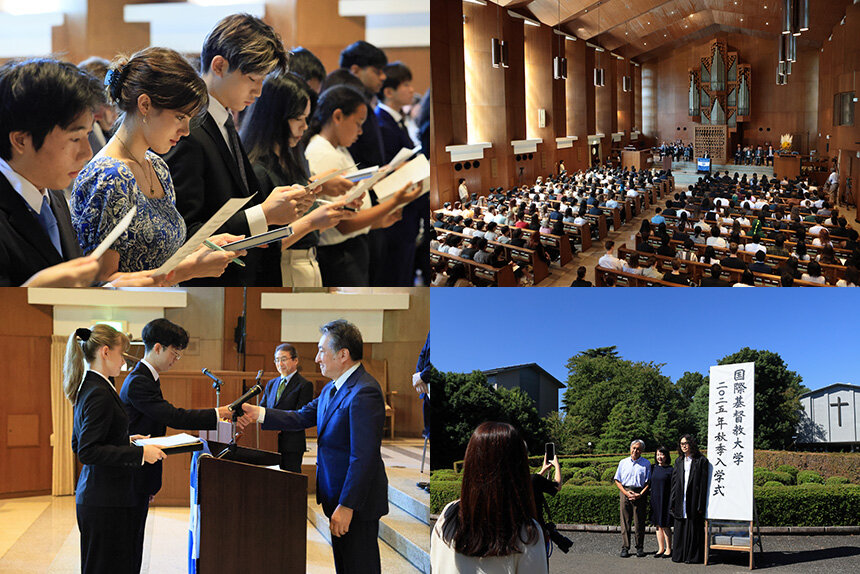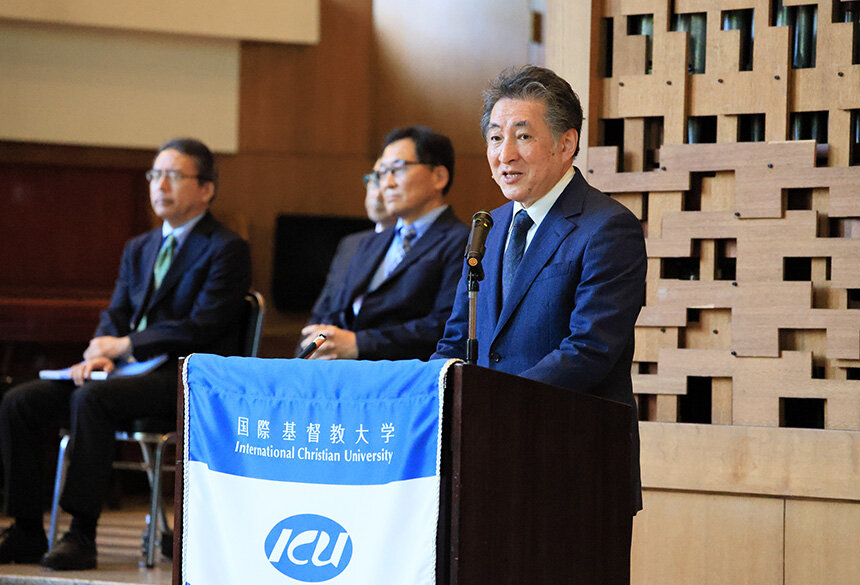NEWS
2025 Autumn Matriculation Ceremony
Update: September 2, 2025

On Tuesday, September 2, ICU welcomed over 332 new undergraduate and graduate students including those graduating from high schools abroad, international schools in Japan, and exchange students from partner universities, at the Matriculation Ceremony held in the University Chapel.
The Ceremony started with a hymn and prayer by Jeremiah L. Alberg, Acting Director of the Religious Center. Next, Stephen Edward Eskildsen, Religious Affairs Committee read Luke 10:38-42.
As per the tradition that has been followed for over 70 years since the founding of the University in 1953, the students' names were announced individually and all new students signed the written pledge to uphold the principles of the Universal Declaration of Human Rights in their student lives.
President Shoichiro Iwakiri gave words of encouragement to the newly gathered new students.
2025 Autumn Matriculation Address by Shoichiro Iwakiri, President

A warm welcome to all of you who are entering our College of Liberal Arts and our MA and PhD programs. At the same time, I extend my warmest regards to all your family members and friends who are joining us online.
In Japan, the disaster caused by the second World War made people deeply recognize the value of peace. After the end of the War, Japan was under Allied occupation, and regained its sovereignty in 1952. It was at this time that our university took its first steps as an education and research institution, purchasing the land for its campus with donations from citizens of North America and Japan, under the motto "University of Tomorrow".
The first students entered ICU in 1953.
Since its founding, ICU's mission has been to nurture students to become international citizens, or in today's terms, global citizens, and peacebuilders. And from the outset, ICU has valued individuality, freedom, democracy, equity, dialogue, internationalism, diversity and critical thinking. Underpinning these values were a mindset and code of behavior in the service of God and humanity. These were not just ideals, but also concrete content to be put into practice in life.
One of the important roles of university education is to actualize these ideals, to anchor them in one's own culture through daily life on campus, and to share them with others.
As the most appropriate educational system for this purpose, ICU has practiced a liberal arts education since its inception, currently under the name of Arts and Sciences. It is a flexibly structured education and research system that provides abundant intellectual nourishment.
You will now be studying in a department or graduate school program of Arts and Sciences. I have repeatedly pointed out what Arts and Sciences mean in the liberal education of ICU: Science here has the original meaning of the Latin word, scio (scientia)- knowledge, knowing; Art is also used in its original sense of "skill". In other words, learning in the liberal arts is a combination of the act of discovering the unknown and bringing it into the realm of knowledge, and the skill of transforming something new and unformed into a form that can be shared with others.
It may sound tautological, but the liberal arts liberate you.
In his recent book, Joseph Stiglitz, a Nobel prize winning economist, says that 'a liberal education is freeing', and he explains how it works as follows: 'it enables people to see matters more broadly, beyond the viewpoint they may have been given by their parents or their community. It enhances individual agency and autonomy.' (Stiglitz, Road to Freedom, 2024)
Through your learning at ICU you can broaden your viewpoint and will have a deeper understanding of the world, nature, society and humanity.
In fact, as the basis of learning at ICU there is passion and enjoyment to discover something new and to share it with others. I hope that, by pursuing your studies, you will become someone who brings innovation to society and, at the same time, I hope you will be innovative for yourselves.
*
When I was a graduate student, I came to know an ancient Greek proverb: kalepa ta kala, which means 'fine things are difficult'. Socrates, for example, refers to it in Plato's Republic when he tries to persuade his interlocutors of the necessity of the true type of usage of philosophy required for a State to attain perfection.
In my case, it was in a book of French Renaissance poetry that I learned the proverb. This proverb can be adopted by each one of us for our own intellectual interest, and each domain of interest has its own 'fine things'.
In your college life, you will certainly pursue 'fine things' as you determine your academic and ontological objectives. Your 'fine things' represent a kind of solution you will discover to questions you will set yourself. In our current social, international and natural situations, many problems, such as climate change, war, inequality, disinformation, etc. confront us. The act of finding solutions will not be easy and, once found, theoretical solutions will be hard to implement in society. So yes, 'fine things are difficult', but I hope you will like this difficulty as a means of creating a good society in order to live in harmony with others and with nature. Your learning at ICU which starts today is the basis of this creation you will pursue through your life.
Education shapes the way we see the world and, at the same time, through critical thinking, it makes us conscious of the difference and diversity in our respective thoughts about the world, and the visions we have of it. ICU academic and office staff seek to contribute to your shaping of yourselves, of your own systems of thought and visions, and of your moral development in which honesty and trustworthiness are valued as indispensable for good communication.
Please enjoy the Liberal Arts at ICU, make good friends, and have rich experiences !
Welcome to ICU !
